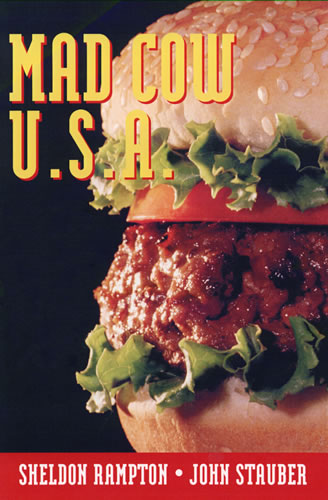Harrison Returns to Corporate Pastures
Submitted by Diane Farsetta on
 Alisa Harrison, who went from being the National Cattlemen's Beef Association's executive director of public relations to being the U.S.
Alisa Harrison, who went from being the National Cattlemen's Beef Association's executive director of public relations to being the U.S.

Submitted by Diane Farsetta on
 Alisa Harrison, who went from being the National Cattlemen's Beef Association's executive director of public relations to being the U.S.
Alisa Harrison, who went from being the National Cattlemen's Beef Association's executive director of public relations to being the U.S.
Submitted by Bob Burton on
Swiss citizens backed a five-year moratorium on commercial release of genetically modified plants and animals, despite opposition from their government and industry groups. Fifty-five percent of the voters backed the moratorium. The ballot initiative followed the collection of 100,000 signatures opposing a 2004 law approving commercial release of genetically engineered crops. "All the farmers' organisations were behind this proposal, which they see as a chance for Swiss agriculture," Daniel Ammann, a spokesman for the pro-moratorium coalition, told Reuters.
Submitted by Diane Farsetta on
"One large and important producer of genetically modified (GM) crops - Monsanto - has engineered public opinion to reduce critical scrutiny," writes a group of South African, Mexican and American academic researchers.
Note: This article was written for CorpWatch, and also appears on their website.
Earlier this summer in Minnesota, the well-dressed woman walked briskly across the front of the red brick classroom and up to the microphone. The moderator smiled and nodded in her direction. Looking down at her notes, she began. "Good afternoon. Thanks for holding this session. And while we are here in this room discussing this important issue, 200 people in Gering, Nebraska, are looking for new jobs. Their packing plant closed this week because they could not source enough cattle due to the embargo."
Submitted by Diane Farsetta on
"Saying their livelihoods are threatened, powerful forces that drive California's $27 billion agricultural economy are mobilizing to defeat a November ballot initiative to ban biotech crops in Sonoma County, and possibly even prohibit such county bans with new legislation in coming days," reports the Sacramento Bee.
A popular Texas bumper sticker reads: "The only mad cow in America is Oprah." Not anymore, after the U.S. Department of Agriculture recently announced that the first confirmed home-grown case of mad cow is a Texas beef cow.
As Sheldon Rampton and I report in Mad Cow USA, the United States failed to take the measures necessary to stop the spread of the fatal dementia dubbed mad cow disease. However, a successful PR campaign by industry and government has, to this day, fooled most of the press and the public into believing that all necessary steps were taken long ago. A major part of the effort to spin and intimidate media coverage involved suing Oprah Winfrey under the Texas Food Disparagement Act, after her 1996 program examining mad cow risks in America.
Late Friday, June 24, is a perfect time to bury bad news in Washington, DC. That's when Mike Johanns, the United States Secretary of Agriculture held a news conference. He announced that a beef cow suspected last November to be positive with mad cow disease, and finally properly tested, was indeed positive. Even now the USDA is keeping secret which state the cow was from, but Texas has long been mentioned in media articles.
Submitted by Diane Farsetta on
As PR Watch previously reported, the U.S.
The US government's elaborate cover-up of mad cow dangers in the United States has begun to unravel. Twenty-four hours after our successful protest (with Organic Consumers Association) of the US Department of Agriculture's mad cow dog-and-pony show in St. Paul, USDA Secretary Johanns was forced to admit that a cow tested last year and declared safe in fact DID have mad cow disease, or at least has tested positive on the definitive Western Blot test recently administered by USDA and considered the 'gold standard' for BSE testing.
I've often charged that the USDA is hiding US cases of mad cow by using the wrong testing procedures and by failing to conduct food safety tests on millions of animals and this announcement proves it. USDA finally used the correct test -- the Western Blot test -- on this suspect animal and it has proven to be a case of mad cow disease.
The online free encyclopedia Wikipedia defines "dog-and-pony show" as a public "display that is somewhat pathetically contrived." That's what the new U.S. Secretary of Agriculture, Mike Johanns, is convening this Thursday, June 9, in St. Paul, Minnesota.
Secretary Johanns will lead a roundtable discussion dominated by the most powerful agricultural lobby organizations in the United States to spread the good news that mad cow disease is no longer a problem in North America. The invited participants include the American Farm Bureau, the American Meat Institute, the National Cattlemen's Beef Association, the National Meat Association, the National Milk Producers and the National Renderers Association. Not a single consumer, human health or public interest group was invited to speak, nor were any scientists who research mad cow and related diseases, such as Nobel laureate Dr. Stanley Prusiner. The USDA hopes to convince the assembled news media that it's time to open the U.S. border to Canadian cattle and time for Japan and Korea to accept U.S. beef and cattle.
Center for Media and Democracy (CMD)
520 University Ave, Ste 305 • Madison, WI 53703 • (608) 260-9713
CMD is a 501(c)(3) tax-exempt non-profit.
© 1993-2025